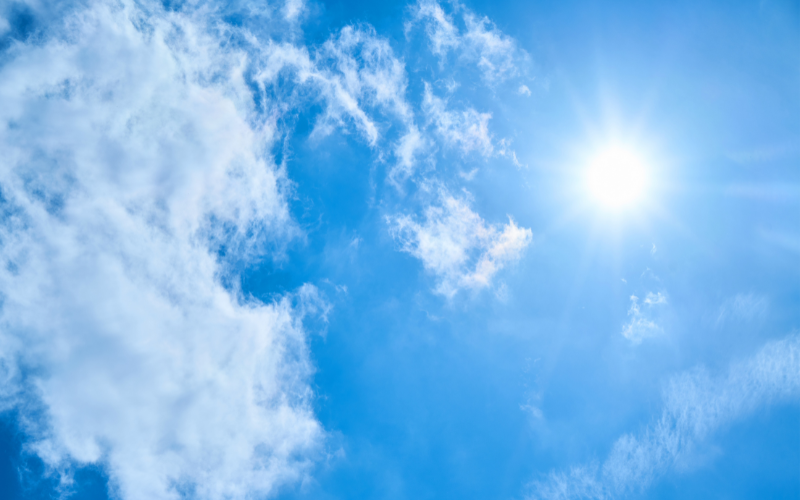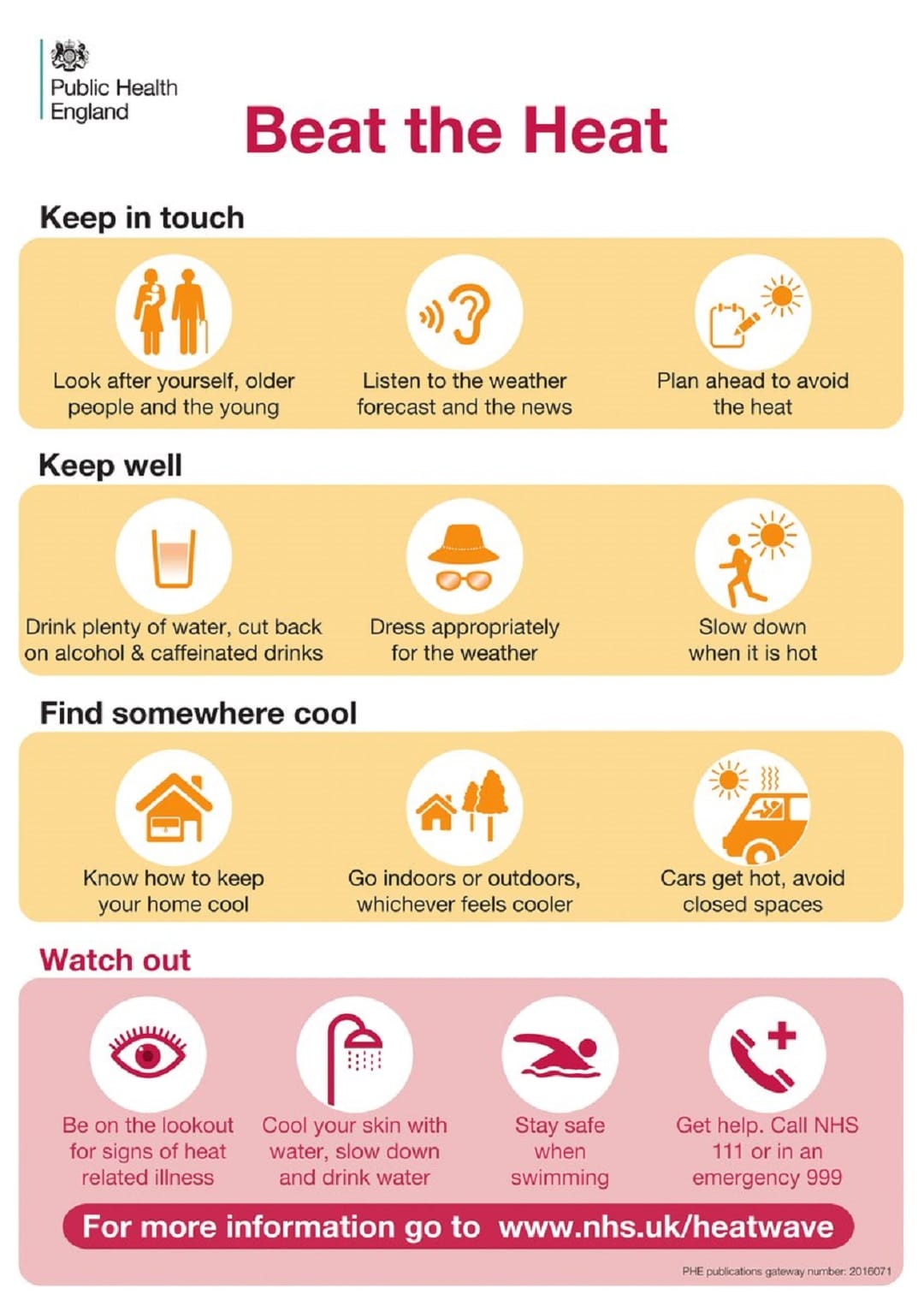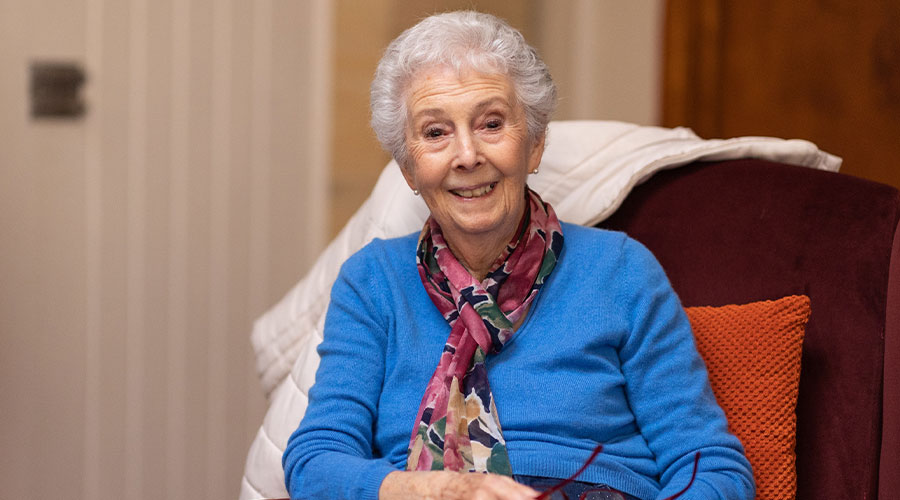How to Stay Cool During Hot Weather

As summer arrives - bringing with it warmer weather and possible heatwaves - it’s really important to be prepared and protect your health. People living with dementia are at even greater risk of overheating as they might not be able to acknowledge they are too hot or know how to cool down.
Check out our tips below to help you stay cool and calm in warmer weather.
Top 12 tips to stay cool
- Close blinds and curtains to keep the heat out of rooms
- Avoid being out in the sun during the hottest part of the day (between 1pm and 3pm) and plan your day to avoid heavy activity
- If you have room in your freezer, put a bedsheet in the freezer an hour or so before you're due to go to bed
- Invest in a fan, or have air-conditioning installed - you might want to get some guidance on this to be fitted properly
- Wear lightweight, loose-fitting, light-coloured cotton clothes.
- Give your feet air to breathe by going barefoot indoors or wearing sandals where it’s safe to do so
- Open windows when the air feels cooler outside than inside, and try to get air flowing through your home. Be careful when leaving your window open at night, make sure you close any windows downstairs or in easy reach
- Turn off electrical equipment that’s not in use
- If you can, visit public buildings (such as places of worship, local libraries, or supermarkets) which are likely to have air conditioning
- Avoid time in your car and purchase a windscreen protector to block the heat whilst you’re not driving
- Add ice cubes to your drinks and it's also a good idea to put some chopped up fruit in the freezers as a cool, healthy snack
- Run a flannel or small towel under the cold tap and wear it around your neck.
Top five tips to be prepared
- Make sure medicines are stored below 25°C or in the fridge (read the storage instructions on the packaging)
- Check the weather forecast and any high-temperature health warnings so you can plan to avoid situations where you become dangerously hot
- If you have to go out in the heat, take water with you, try to keep in the shade, apply sunscreen, and wear a hat and light clothing
- Stock up on ice lollies! Try to avoid ones with high sugar content, you could make your own out of fruit juice and even add pieces of fruit. Here are some ideas from BBC Good Food
- Check in with your GP about what medications you take, as some prescription medications can impair the body’s ability to regulate temperature.
Skin protection
It’s always nice to get out in the fresh air and feel the sunshine on our skin but sunburn can be serious, and increase your risk of skin cancer. Anyone of any age can develop skin cancer, so it’s important to protect your skin, whatever your skin type.
- Use sunscreen of at least SPF (Sun Protection Factor) 30. Apply it generously and re-apply every two hours. If you've been in water, reapply as soon as you’re dry
- Apply sunscreen to exposed parts of your body
- Wearing a hat will help to protect your head and face
- Choose sunglasses that have a CE mark, UV400 label, or a statement that they offer 100% UV (ultraviolet) protection
- Heat can dry out our skin so keep using moisturiser too.
If you have moles or brown patches on your skin and notice any changes in size, shape, or colour, make sure you visit the GP as soon as you can. For more information, visit the Cancer Research website >
Dehydration
When it’s warm it’s easy to get dehydrated as we lose salts through sweating. Make sure you keep up your fluids, and try to aim for 6-8 glasses a day. You could also eat foods with high water content like fruit (especially apples, oranges, watermelon, strawberries, and peaches), salads (especially cucumber, lettuce, watercress, spinach celery and tomatoes), broccoli, mushrooms and jelly.
If you are fasting for Ramadan during a heatwave, it is important to drink before dawn and follow the advice here to keep cool and prevent dehydration. If you become dehydrated you should break the fast in order to rehydrate, this can be compensated by fasting at a later date. For more advice on this, visit our observing Ramadan in later life page >

Other sources of Vitamin D
Skin protection is important but some direct exposure to the sun is essential for the production of vitamin D. If you can, get out for a short walk in the sunshine during the cooler parts of the day to boost your vitamin D levels every day.
Or if you can’t get out, you’ll still get the benefits from being in your garden or sitting by an open door or window.
If you’re worried about being out in the sunshine, there are other ways you can get the benefits of Vitamin D:
- In certain foods - salmon, sardines, and other oily fish, eggs and fortified spreads
- The Government recommends vitamin D supplements for some groups of the population, including people aged 65 and over
- If you think you could be at risk of not getting enough vitamin D, particularly if you are housebound or cover your skin for cultural reasons, raise this with your doctor.
Overheating
It’s easy for overheating to happen, watch out for the following: muscle cramps in your arms, legs or stomach, mild confusion, weakness or sleep problems. If you experience any of those symptoms rest in a cool place and drink plenty of fluids. Seek medical advice if your symptoms become worse.
Heat exhaustion and heatstroke
Heat exhaustion is fatigue from prolonged time in sunshine and heat. For more information and guidance, please visit the NHS website >
Symptoms
According to the NHS, the symptoms of heat exhaustion include headaches, dizziness, nausea or vomiting, intense thirst, heavy sweating, and a fast pulse.
What should I do if I have symptoms?
- find a cool place
- change into loose clothes
- drink plenty of water or fruit juice
- sponge yourself down with cool water or have a cool shower.
According to the NHS, your symptoms should improve within 30 minutes. If you're feeling better but still have any concerns, call your doctor or NHS 111 for advice.
Heatstroke
Heatstroke can develop if heat exhaustion is left untreated – it can also develop suddenly and without warning. For more information and guidance, please visit the NHS website >
Symptoms of heatstroke
According to the NHS, the symptoms of heatstroke include confusion and disorientation, seizures and loss of consciousness.
What should I do if I have symptoms?
- call 999 immediately (available to call for free 24/7)
- if you have a personal alarm, press the button on your pendant to call for help
- while waiting for the ambulance, follow the advice given on the phone for heat exhaustion
- do not give fluids to anyone who is unconscious.
Other support available
- Age UK Healthy Eating Advice
- Cancer Research - SunSmart website
- Met Office website
- Beat The Heat - GOV.uk
Page last updated: September 2023.
MHA in your community
Find the care home, retirement community, or support group that’s right for you

